Dentsu Institute and Doshisha University Announce Results of World Values Survey 2019 in Japan
Apr 27, 2020
- Research Report
Dentsu Institute*1 (Executive Producer: Naoki Tani), an internal organization of Dentsu Group Inc. (Tokyo: 4324; ISIN: JP3551520004; President & CEO: Toshihiro Yamamoto; Head Office: Tokyo; Capital: 74,609.81 million yen), and the Ikeda Laboratory*2 (Professor: Ken’ichi Ikeda), a facility engaged in media and social psychology research at Doshisha University (location: Kyoto City, Kyoto Prefecture; President: Tomoko Ueki), participated in the World Values Survey in Japan (conducted in September 2019) and presented the results of the time series comparative analysis, etc. performed with regard to changes in people’s perceptions. Launched in 1981, the World Values Survey (hereinafter the “WVS”) is a worldwide survey involving research institutions in approximately 100 countries and societies. The 7th wave of the WVS is still in progress in other participating countries; here we release only Japan's results, which were compiled last year. The following outlines the results:
Note: These results do not reflect the impact of COVID-19, as its outbreak had not yet been identified at the time when the Survey was conducted.
«Outline of Survey Results»
1. A lower priority is placed on working. Significant changes have occurred in the perception of “work.”
2. An increasing percentage of people, particularly the young, feel that they have “freedom of choice” and “control over their lives.”
3. People show more respect for diversity compared to 9 years ago.
4. Subjective levels of happiness and life satisfaction increased slightly and remain stable.
5. Socioeconomic disparity is widening slowly but surely. The proportion of people describing themselves as belonging to the “upper” or “lower” class has increased slightly.
6. The 21st century will be an era when Japan cooperates with the global community while respecting its “own culture and traditional values.”
7. People are less interested in “politics” compared to 9 years ago. The younger the people are, the less interested they are in politics.
«Summary of Survey Results»
The results demonstrate that while people’s perceptions are changing significantly, these changes have not necessarily manifested as an interest in social reforms or politics.
Changes in perceptions and behaviors of people will have a significant impact on the quality of society. As Japan and the world face a number of social challenges, Dentsu Institute and the Ikeda Laboratory of Doshisha University will continue to identify changes in people’s perceptions and behaviors and promote the “Quality of Society” activities, exploring possibilities for an ideal future and ways to bring it to fruition.
«Key Findings from Survey Results»
Significant changes have occurred in the perceptions of “work” (see item 1 below) in the nine-year period since the previous wave of the Survey in 2010, with the doubling of the ratio of people who answered that “less importance placed on work” was “good” or they “don’t mind.” In conjunction, there has also been an increase in the percentage of people who feel they have “freedom of choice” and “control over their lives” (see item 2 below). The younger the respondents are, the higher the proportion of such people is. Further, answers to questions about homosexuality, gender, etc. show that respondents’ perceptions have made a radical shift in the direction of respecting diversity (see item 3 below).
While people’s perceptions change in other areas, the subjective levels of happiness and life satisfaction (see item 4 below), which have remained high since the 1st wave, have stayed at the same level with a slight increase from the 6th-wave Survey. With regard to the subjective social class (see item 5 below), on the other hand, there has been no change in the ratio of respondents who think they belong to the “upper middle,” “lower middle,” or “working class” but a slight increase in the ratios of respondents who consider themselves to belong to the “upper” or “lower” classes.
There continues to be a high perception of Japanese culture and traditional values (see item 6 below), indicating that Japanese people hope to cherish their national values while cooperating and building closer relationships with the global community. No increase was observed in political interest (see item 7 below).
The Survey’s major topics and data are provided in the following sections.
«Major Topics and Data»
1. A lower priority is placed on working. Significant changes have occurred in the perception of “work.”
Compared to the previous wave of the Survey nine years ago (2010), the importance of work in life decreased by about 4 points (from 84.2% in 2010 to 80.0% in 2019). At the same time, a two-fold increase (from 21.1% in 2010 to 42.6% in 2019) is seen in the proportion of respondents who answered that “less importance placed on work” is “good” or they “don’t mind.” These results illustrate remarkable changes in Japanese people’s perception of “work.”
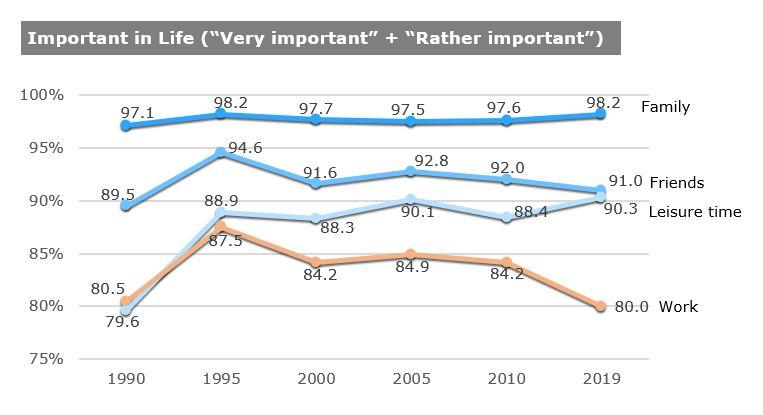

2. An increasing percentage of people, particularly the young, feel that they have “freedom of choice” and “control over their lives.”
In comparison with the previous wave of the Survey, there is an increase (from 50.0% in 2010 to 58.4% in 2019) in the proportion of respondents who answered they feel that they have “freedom of choice” and “control over their lives.” The degree of freedom is higher particularly among young respondents.

3. People show more respect for diversity compared to 9 years ago.
The results show a significant shift towards respecting other people’s diversity; for example, an increasing percentage (from 33.2% in 2010 to 54.4% in 2019) of respondents answered that “homosexuality” is always “justifiable,” reaching a majority for the first time since the first wave. It is also for the first time since the first wave that more than 50% of the respondents disagreed the statement that “men make better business executives/political leaders than women do” (business executives: from 42.7% in 2010 to 63.6% in 2019; political leaders: from 37.3% in 2010 to 54.4% in 2019).
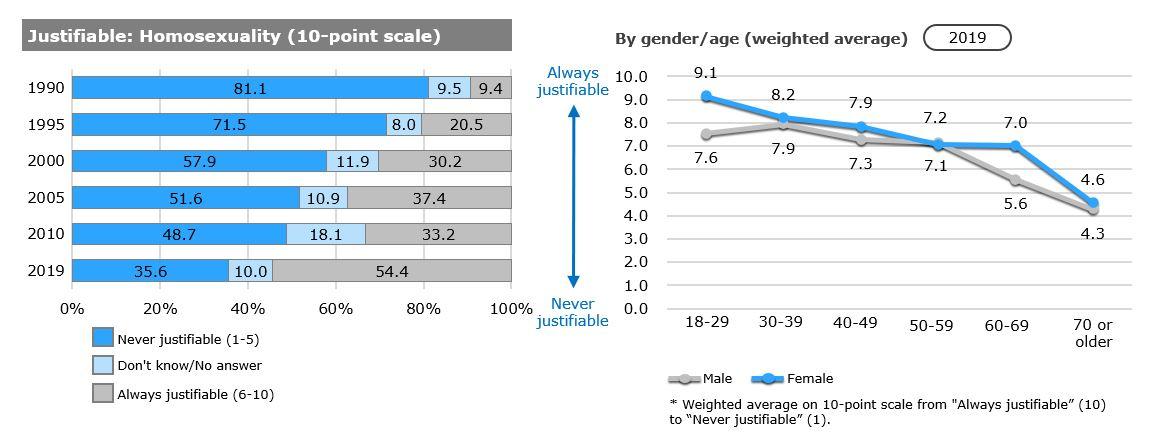
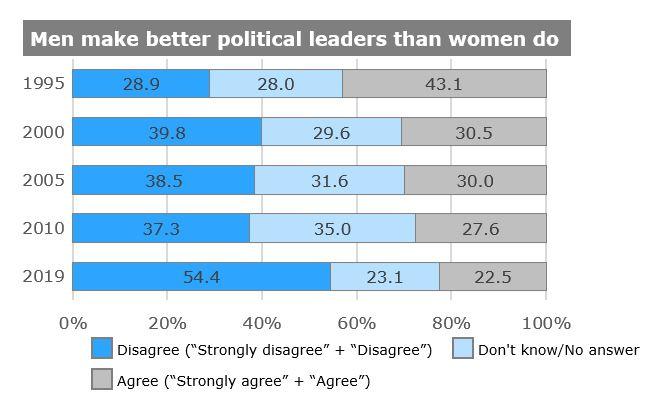
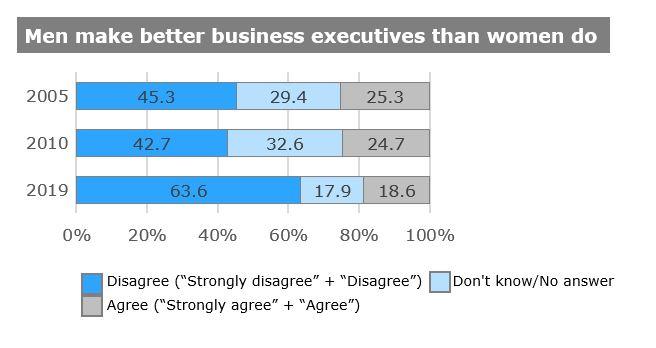
4. Subjective levels of happiness and life satisfaction increased slightly and remain stable.
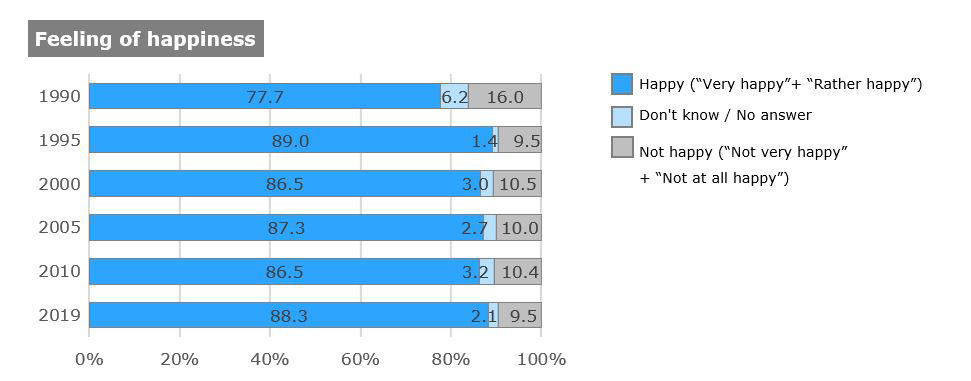
Compared with the previous wave of the Survey (2010), there has been a slight increase in the ratios of respondents who feel “happy” (from 86.5% in 2010 to 88.3% in 2019) or “satisfied” with their lives (from 73.8% in 2010 to 74.4% in 2019). While respondents have changed their perception about other topics, their happiness and life satisfaction levels remain high.
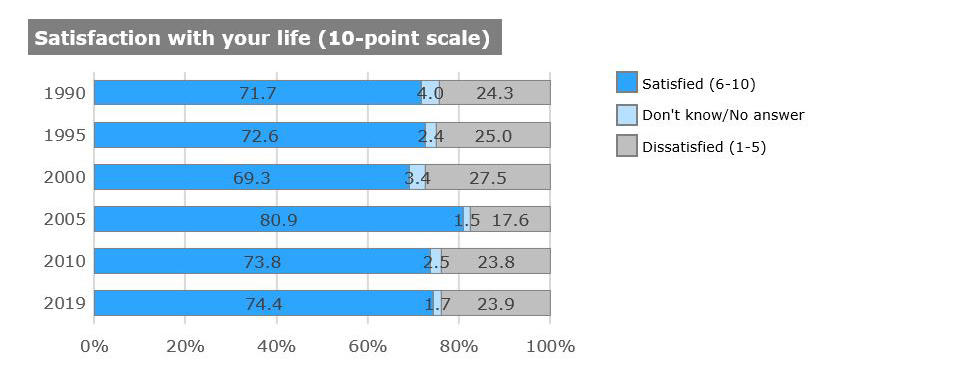
5. Socioeconomic disparity is widening slowly but surely. The proportion of people describing themselves as belonging to the “upper” or “lower” class has increased slightly.
If we look at the topic of Social Class in chronological order, we can see: 1) a downward trend (from 56.3% in 1990 to 42.2% in 2019) in the ratio of respondents who said they belong to the largest segment of lower middle class; 2) a continued upward trend (from 5.1% in 1990 to 9.6% in 2019) in the percentage of those who think they belong to the lower class; and that 3) the ratio of respondents who feel they belong to the upper class exceeded 1% (0.5% in 1990; 1.5% in 2019) for the first time. Despite the fact that the happiness and life satisfaction levels are kept relatively high, the ratios of respondents who feel that they belong to the upper or lower social classes have been on a slight but continued increasing trend throughout the last 29 years. This suggests that these ratios may continue to change further, and attention must be paid to possible developments in the future.
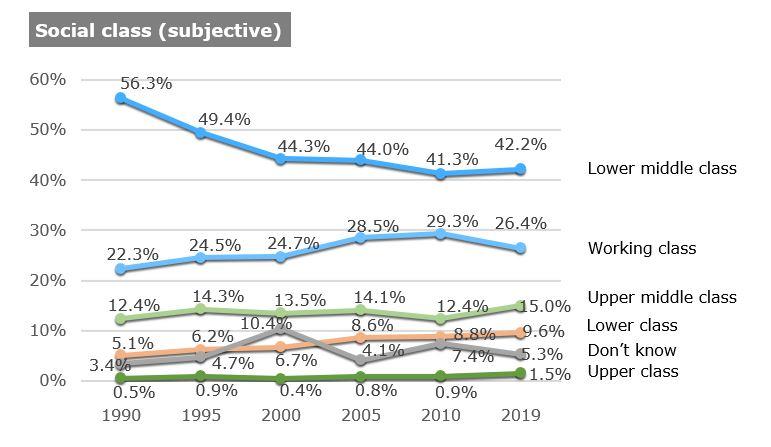
6. The 21st century will be an era when Japan cooperates with the global community while respecting its own culture and traditional values.
The results revealed the respondents’ perception that they hope to cherish their national values while cooperating and building closer relationships with the global community. In response to the question of how Japan and Japanese people should be in the 21st century, 91.1% of the respondents said that “Japan’s culture and traditional values should be cherished.” Further, a majority of them answered “agree” to the following statements that Japan should: 1) Deepen exchanges with Asian nations and play a role of reliable partner; 2) Disseminate the good Japanese way of doing things across the world; and 3) Change itself to be better understood by foreigners.
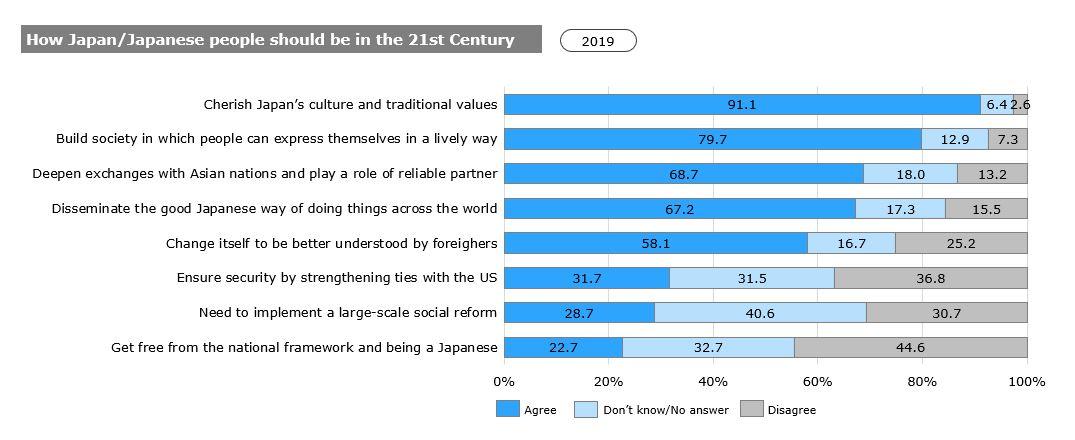
7. People are less interested in “politics” compared to 9 years ago. The younger the people are, the less interested they are in politics.
In addition, compared to nine years ago, the percentages of respondents who: 1) place importance on politics in their daily lives; and 2) are interested in politics remain unchanged or decreased (from 66.1% in 2010 to 64.3% in 2019 for the former topic; from 65.5% in 2010 to 59.8% in 2019 for the latter topic). It is also evident that the younger the respondents are, the less interested they are in politics.
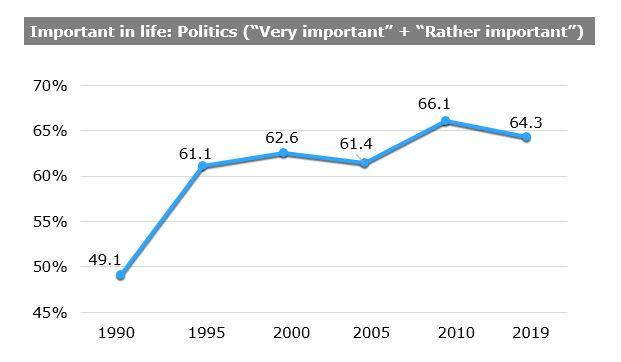
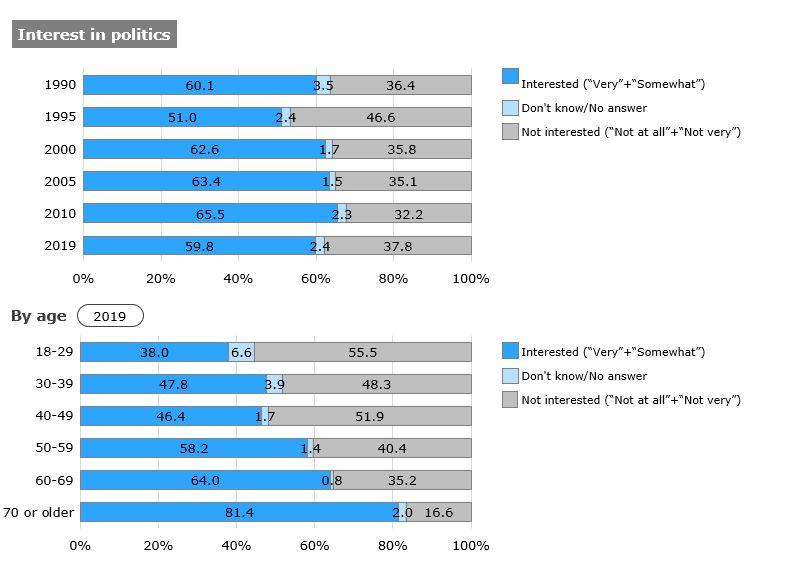
The World Values Survey report can be downloaded free of charge from Dentsu Institute website mentioned below. (Japanese)
URL: https://institute.dentsu.com/articles/1037/
«Survey Overview»
The World Values Survey is a worldwide project with participating research institutions in approximately 100 countries and societies. Designed to examine changing values and their impact on society, the nationally-representative Survey draws roughly 1,000 samples from a gender-inclusive population of respondents aged 18 years and older using a common questionnaire. It consists of about 90 questions and 190 topics ranging from politics, economy, and labor to education, religion, and family. Dentsu Institute has participated in this project since the second wave in 1990 and conducted surveys and analyses in Japan through the present day.
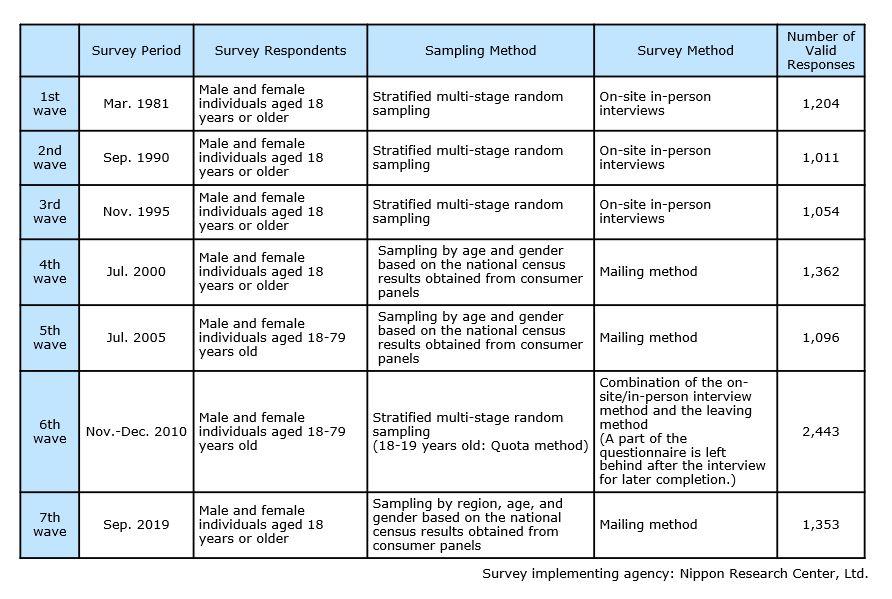
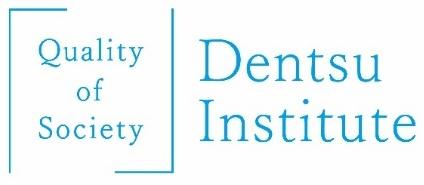 * 1: Dentsu Institute
* 1: Dentsu Institute
Inaugurated as an internal organization of the Dentsu Group Inc. (pure holding company) in January 2020, Dentsu Institute has continued to be engaged in activities under the theme of “Quality of Society” since April 2019.
In order to identify what changes are occurring in people and society and explore possibilities for an ideal future and ways to bring it about, the Institute is focused on the accumulation of knowledge and insights from pioneering and unique perspectives, by taking part in, for example, the World Values Survey.
* 2: Ikeda Laboratory
Ken’ichi Ikeda Media Study Laboratory, Department of Media, Journalism and Communications, Faculty of Social Studies, Doshisha University
Representative: Professor Ken’ichi Ikeda
Research areas: Media communications, reconstruction of political social psychology, social-psychological study of social reality
URL: http://www.ikeken-lab.jp/
[Contact regarding the WVS]
Yamazaki, Nitto, and Nakagawa, Dentsu Institute
E-mail: d-ii@dentsu.co.jp
URL: https://institute.dentsu.com
[Media contact]
Group Corporate Communications Office, Dentsu Group Inc.
Tel: +81 3 6217 6601
E-mail: group-cc@dentsu-group.com
As part of its response to the outbreak of COVID-19, Dentsu Group Inc. has moved to a remote work environment. If you need to contact us during the remote work period, please email us at the address above.

